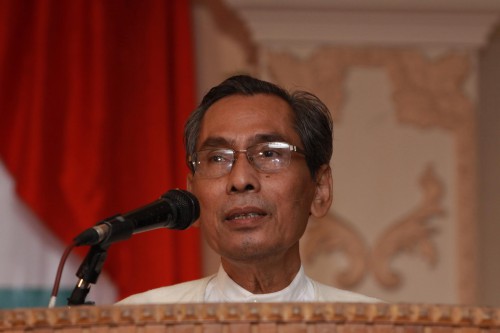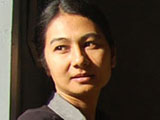Maung Wuntha: The Fight Inside
After fighting for democracy and free press in Burma, a respected journalist begins his battle with cancer.

Maung Wuntha. Photo provided by the author.
The piece from Pyithu Khit (People’s Age) was part of the dozen or so daily updates I read from Burma; it was a column, posted in early October 2012 and written by the respected Burmese journalist Maung Wuntha. In just paragraphs he let the world know the details of his lung cancer diagnosis. This news shocked and saddened me.

- In Burma if you want to hear about issues the newspapers can’t talk about, you should go to a tea shop. Tea houses were where I used to meet with other activists, writers and artists, as well as where I built friendships. Within tea houses we talked about Burmese writers, literary trends we noticed, and, of course, politics. This online space attempts to emulate the conversations I enjoyed in Rangoon’s tea houses.

- Khet Mar is a journalist, novelist, short story writer, poet, and essayist from Burma. She is the author of one novel Wild Snowy Night, as well as several collections of short stories, essays and poems. Her work has been translated into English and Japanese, been broadcast on radio, and made into a film. She is a former writer-in-residence at City of Asylum/Pittsburgh.
While reading the article I looked at a series of photographs of Maung Wuntha, who I met in 1992 inside the notorious Insein Prison. On the day of my release, as usual, the political prisoners were gathered in the lobby to listen to the authorities give speeches. Among the prisoners I recognized a skinny man who seemed strong, and was looking around the room with a smile. That man was Maung Wuntha, and since our first encounter, which left me with a feeling of freedom, he has become an unforgettable figure in my life.
Maung Wuntha started working as a journalist in 1962 and served as an editor for the New Light of Burma, Hanthawaddy, and Bothahtaung daily newspapers between 1970 and 1988. During this period he was awarded the National Endowment for Humanities fellowship for professional journalists to study at the University of Michigan, Ann Arbor. But after 1988 he was forced to resign as editor of Botahtaung because of his involvement in the 1988 Uprising. Consequently, he was detained in 1989 until 1990. However his political activism didn’t stop there. After his release Maung Wuntha went on to co-found the National League for Democracy with Daw Aung San Suu Kyi and eventually won a seat in Burma’s 1990 parliamentary election. Unfortunately he was arrested again a few months later and sentenced to ten years imprisonment, though he only served two years. He was released in 1992, at the same time that I was, by an amnesty decision. He was detained for a third time in 1996 and released in 2001.
After his third release, Maung Wuntha resumed his career as a journalist and has worked as an editor for several journals, which he continues today. He regularly writes about Burma’s political development since the quasi-civilian government took power in March 2010. He is also the founding editor of an intellectual magazine called The Thought & Vision, and has acted as chief editor for the journal Pyithu Khit, which was launched in July 2010.
In 2010, he was chosen as a Reagan-Fascell Democracy Fellow of the National Endowment for Democracy in Washington D.C. During the winter of 2010, which was difficult for a Burmese person to endure, he also came to my home in Pittsburgh, Pennsylvania. And although we talked until dawn, we still saved many conversations for the future.
Since we have known each other since 1992, I have had many reasons to seek Maung Wuntha’s help; I often call him when I need to contact someone he knows in Burma. Plus, when my American friends ask me for Burmese contacts, I invariably mention his name. He always fulfills my requests and I do not hesitate to ask.
Now, in the Burma of 2012, the Myanmar Press Council has been founded and writing no longer needs to pass through the censorship board’s approval process to be published. Maung Wuntha, who has striven to help develop Burma’s press, was recently selected as vice-chairman of the Press Council. He’s also a member of the selection committee for the National Literary Awards and is the chairman of the National Press Award Committee, an independent organization of Myanmar journalists. Additionally, he is an appointed member of the Presidential Commission of Inquiry on the Rakhine State Conflicts and in early 2012, he established the Political Journalism School in Rangoon where he teaches young journalists fundamentals about democracy and human rights.
Even though Maung Wuntha has been arrested several times for his activities related to democracy and human rights—and has stood strong against harassment and censorship for many years—the deadly disease of cancer now threatens him.
Soon after Maung Wuntha posted about his cancer on Facebook, readers started posting encouraging words and prayers on his wall. More appeared with each passing minute. He received these words from others because of his work with them. He already has strength enough to face the difficulties, but with the love of his supporters I believe he can fight against this cancer.





One Comment on "Maung Wuntha: The Fight Inside"
R.I.P 11.08.2013